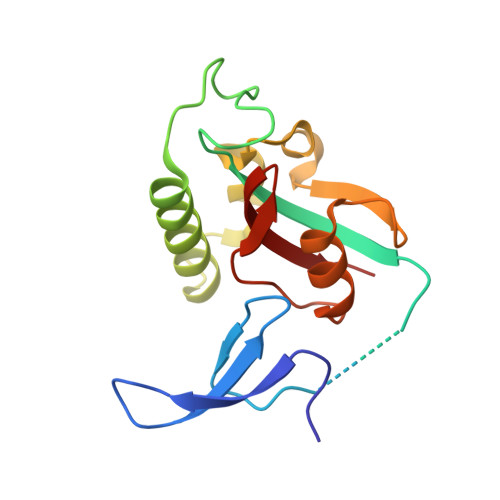Structural and Kinetic Analysis of Prolyl-isomerization/Phosphorylation Cross-Talk in the CTD Code.
Zhang, M., Wang, X.J., Chen, X., Bowman, M.E., Luo, Y., Noel, J.P., Ellington, A.D., Etzkorn, F.A., Zhang, Y.(2012) ACS Chem Biol 7: 1462-1470
- PubMed: 22670809
- DOI: https://doi.org/10.1021/cb3000887
- Primary Citation of Related Structures:
3TCZ, 3TDB - PubMed Abstract:
The C-terminal domain (CTD) of eukaryotic RNA polymerase II is an essential regulator for RNA polymerase II-mediated transcription. It is composed of multiple repeats of a consensus sequence Tyr(1)Ser(2)Pro(3)Thr(4)Ser(5)Pro(6)Ser(7). CTD regulation of transcription is mediated by both phosphorylation of the serines and prolyl isomerization of the two prolines. Interestingly, the phosphorylation sites are typically close to prolines, and thus the conformation of the adjacent proline could impact the specificity of the corresponding kinases and phosphatases. Experimental evidence of cross-talk between these two regulatory mechanisms has been elusive. Pin1 is a highly conserved phosphorylation-specific peptidyl-prolyl isomerase (PPIase) that recognizes the phospho-Ser/Thr (pSer/Thr)-Pro motif with CTD as one of its primary substrates in vivo. In the present study, we provide structural snapshots and kinetic evidence that support the concept of cross-talk between prolyl isomerization and phosphorylation. We determined the structures of Pin1 bound with two substrate isosteres that mimic peptides containing pSer/Thr-Pro motifs in cis or trans conformations. The results unequivocally demonstrate the utility of both cis- and trans-locked alkene isosteres as close geometric mimics of peptides bound to a protein target. Building on this result, we identified a specific case in which Pin1 differentially affects the rate of dephosphorylation catalyzed by two phosphatases (Scp1 and Ssu72) that target the same serine residue in the CTD heptad repeat but have different preferences for the isomerization state of the adjacent proline residue. These data exemplify for the first time how modulation of proline isomerization can kinetically impact signal transduction in transcription regulation.
- Department of Chemistry and Biochemistry, University of Texas at Austin, 1 University Station A5300, Austin, TX 78712, USA.
Organizational Affiliation:


















